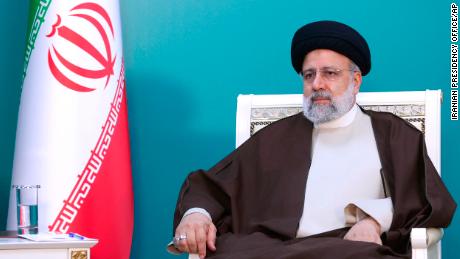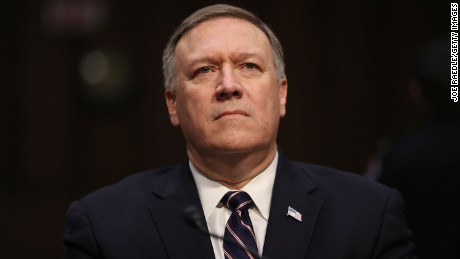(CNN)Secretary of State Mike Pompeo delivered a major speech outlining the Trump administration's Middle East policy on Thursday that took aim at two of the Trump administration's main foes: President Barack Obama and the Iranian regime.
In lengthy remarks at the American University in Cairo, the US' top diplomat invoked Obama's speech in the same city a decade ago to offer a point-counterpoint assessment of the two administration's policy moves. Pompeo accused the former President of laying out "fundamental misunderstandings" in his 2009 speech.
"He told you that radical Islamist terrorism doesn't stem from ideology. He told you 9/11 led my country to abandon its ideals, particularly in the Middle East," Pompeo said. "He told you that the United States and the Muslim world needed 'a new beginning.' And the results of these misjudgments have been dire."
Pompeo cataloged a series of alleged missteps by the Obama administration: underestimating "the tenacity and viciousness of radical Islamism," a failure to act against Syrian leader Bashar al-Assad after his use of chemical weapons, silence "as the people of Iran rose up against the mullahs in Tehran in the Green Revolution."
"What did we learn from all this?" Pompeo asks. "We learned that when America retreats, chaos often follows. When we neglect our friends, resentment builds. And when we partner with enemies, they advance."
Pompeo declared that "the age of self-inflicted American shame is over, and so are the policies that produced so much needless suffering. Now comes the real 'new beginning."
Pompeo: The US will 'work to expel every last Iranian boot' from Syria
Pompeo declared that in "less than two years, the United States under President Trump has reasserted its traditional role as a force for good in this region, because we've learned from our mistakes," he claimed. "We have rediscovered our voice. We have rebuilt our relationships. We have rejected false overtures from enemies. And look at what we have accomplished together."
Those accomplishments included the US withdrawal from the Iran nuclear deal and the re-imposition of sanctions, the move of the US Embassy in Israel to Jerusalem, and the military strikes on the Assad regime -- an action that Pompeo warns the US is willing to repeat if necessary.
Pompeo, whose travels throughout the Middle East come as part of a reassurance tour by administration officials in the wake of President Donald Trump's sudden announcement of a US troop withdrawal from Syria, stressed that the US would remain a partner in the region. However, he noted that the US expects allies to "shoulder new responsibilities."
"Let me be clear: America will not retreat until the terror fight is over," said Pompeo, who reiterated the claim that the US withdrawal from Syria was not "a change of mission."
"We remain committed to the complete dismantling of the ISIS threat and the ongoing fight against radical Islamism in all its forms. But, as President Trump has said, we are looking to our partners to do more in this effort going forward. For our part, our airstrikes in the region will continue as targets arise. We will keep working with our partners in the Coalition to Defeat ISIS," he said.
He vowed that the US would "use diplomacy and work with our partners to expel every last Iranian boot" from Syria, though he did not offer specifics on how such an expulsion would take place.
Pompeo spoke extensively of the US "campaign to stop Iran's malevolent influence and actions against this region and the world," but offered few details beyond the use of sanctions about how the US would achieve its demands.
Silence on human rights
The secretary of state touched upon the issue of religious freedom, but a broader discussion of human rights was notably absent from his address -- he did not use the phrase "human rights" in his remarks.
"What was problematic from my perspective was, one, what was missing. What makes me feel sorry is whenever a senior administration official goes to the Middle East and doesn't even make the slightest reference to human rights," said Robert Satloff, executive director of The Washington Institute for Near East Policy, who also noted Pompeo's minimal reference to democracy.
"By completely ignoring human rights issues in Egypt, he did a disservice to Americans, who expect more from our chief diplomat," said Andrew Albertson, the executive director of Foreign Policy for America.
"In Yemen, we will work for a lasting peace," Pompeo said, but did not mention the humanitarian crisis in that nation. 14 million are on the brink of starvation, aid groups estimate, and the US has been warned that its support for the Saudi and United Arab Emirates-led coalition could contribute to the famine.
Humanitarian aid was mentioned briefly in the context of Iraq and Yemen, but a long-term vision for that aid or the potential impact it could have on capacity building and the fight against extremism was not.
Pompeo skipped many of the traditional points a US secretary of state often makes in Egypt, including references to the historic American role in building Egypt's peace with Israel and to the massive economic support that Washington provides to Cairo.
"To be in Cairo and not make reference to Camp David," the 1978 accord that established the peace, "does not make sense," Satloff said. "To be in Cairo and not make reference to the billions of dollars in economic aid does not make sense."
Pompeo raises diplomatic eyebrows
The Trump administration's top diplomat raised eyebrows with his criticism of the former president, a breach of the core US idea that domestic politics stop at the waterfront and US officials don't air their political spats overseas.
"I actually thought there were some really useful analytical comments he made in the speech," said Satloff, but he added that they "got obscured by the rather unusual practice of publicly criticizing an American president who previously spoke in Cairo. That was a departure from diplomatic norm, to put it politely."
National Security Action, an organization helmed by former Obama administration officials, slammed Pompeo's speech in a release prior to its delivery.
"That this administration feels the need, nearly a decade later, to take potshots at an effort to identify common ground between the Arab world and the West speaks not only to the Trump administration's pettiness but also to its lack of a strategic vision for America's role in the region and its abdication of America's values," it said.
"Secretary Pompeo's speech was remarkable for its disconnection from reality," Albertson said. "It marked another missed opportunity to lay out a serious diplomatic strategy to secure our interests in the Middle East."
Council on Foreign Relations President Richard Haass noted on Twitter that Pompeo "articulated ambitious goals-to expel every last Iranian boot from Syria, to reduce Hizballah's missile arsenal, to help build an Iraq free of Iranian influence-while backing reduced US presence in the Middle East."
"No policy can succeed with ends and means so divorced," Haass said.
However, Nile Gardiner, the director of the Heritage Foundation's Margaret Thatcher Center for Freedom, praised the speech, calling it a "powerful defense of American leadership in the Middle East and also a robust warning to Iran, that the United States will confront it at every opportunity, and ensure it does not gain a foothold in Syria, Lebanon and Yemen."
Uzra Zeya, a former acting assistant secretary and principal deputy assistant secretary in the Bureau of Democracy, Human Rights, and Labor, said that "Pompeo's claims of reinvigorated American leadership in the region fell flat."
She cited the fact that many of the countries mentioned in his speech do not have US ambassadors in place. Five of the nine nations visited by Pompeo on this trip do not have US ambassadors.
Zeya also took issue with the secretary of state's treatment of religion in his speech. At the outset, Pompeo mentioned his own evangelical Christian faith, noting, "We're all children of Abraham: Christians, Muslims, Jews." He criticized Obama for supposed "eagerness to address only Muslims" in his 2009 speech.
"Pompeo's emphasis on his evangelical Christian background, 'radical Islamism' and criticism of the prior administration's Muslim engagement suggests continued animus towards Muslims writ large," Zeya said. "His assertion that 'we are all sons of Abraham' ignores the diversity of a region that includes Yazidis, Baha'i, Zoroastrians and other religious minorities under grave threat."
Pompeo received a warm reception from a key Gulf ally. The United Arab Emirates minister of state for foreign affairs, Anwar Gargash, welcomed the speech, describing it as an important message for stability in the region and saying it highlighted the "importance of alliances and support of friends."





















